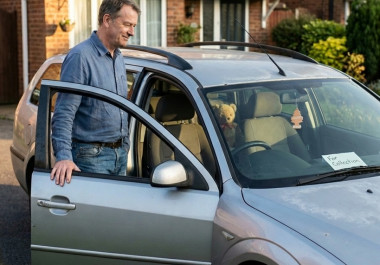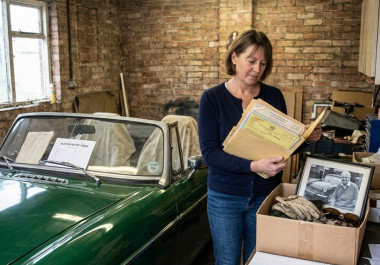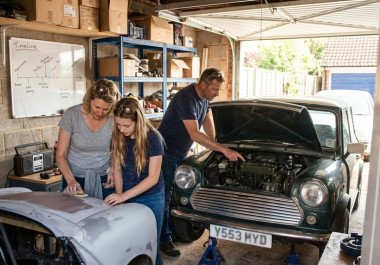Over all our years in operation here at RAW2K, we’re proud to have steadily grown to become the UK’s number one site for salvage car auctions. And with the cost of living biting steadily more over the last couple of years, more and more people are turning to online car auctions for second-hand cars to drive, rather than as simply a source of spare parts. A significant proportion of the cars in our auctions have been involved in collisions, or have sustained some other form of damage, so if you’ve been looking around what we’ve got to offer, you may well be asking yourself. should I buy a written off car?
Well, the short answer is. that depends. Here’s what you need to know.
What is an insurance write-off?
First things first. In the UK, a car is considered written off when the cost of repairing the vehicle exceeds its value, or it is no longer deemed roadworthy after an accident or damage. Insurance companies categorise written-off vehicles into four categories. A, B, S, and N, depending on the severity of the damage.
- Category A. The most severe salvage title. This one indicates that the vehicle is beyond repair and must be scrapped. Parts categorically cannot be reused.
- Category B. This one is used to indicate that the car is severely damaged and must be crushed. However, some parts can be salvaged and used.
- Category S. The car has suffered structural damage (e.g., to the chassis), but it can be repaired and returned to the road, provided it passes all safety checks.
- Category N. The car has not suffered structural damage, but repairs are still needed. This could include damage to electrical components or cosmetic issues.
You’ll be glad you don’t need to be an expert in the various salvage categories, but even a shorthand understanding of how they work can be really helpful for quickly picking out a good deal.
The pros of buying a written-off car
There are a few clear advantages when considering a written-off vehicle. Here’s a quick overview of the main benefits:
- Lower purchase price compared to undamaged cars.
- Opportunity for repairs and restoration.
- Ideal for sourcing parts from Category B cars.
Now, let’s look more closely at each one in detail.
One of the most obvious advantages of purchasing a written-off car is obviously the price. These cars tend to be much cheaper than their non-written-off counterparts. If you’re on a tight budget or looking for a specific model at a lower price, this can be an attractive option.
If you’ve got any mechanical expertise or access to affordable repair services (as many of our customers have), a written-off car can present a useful opportunity. Category S and N vehicles, in particular, can often be repaired to a good standard and put back on the road. As long as this is done safely, it can offer significant savings compared to the cost of a new or undamaged used car. Some buyers look for written-off cars that have already been repaired and restored, allowing them to avoid some of the associated risks while still benefiting from the lower cost.
In some cases, written-off cars are more suitable for people looking for spare parts. Category B vehicles, for example, cannot be repaired for use on the road, but they may have valuable components that can be reused.
The cons of buying a written-off car
While the potential savings are tempting, there are also several downsides to buying a written-off car. For example:
- Risk of hidden or poorly repaired damage.
- Lower resale value compared to undamaged vehicles.
- Difficulty insuring or higher insurance premiums.
The most obvious concern is the possibility of hidden or poorly repaired damage. Even though Category S and N cars can be legally repaired and put back on the road, there’s not always a concrete guarantee that the repairs have been done to a high standard. Undetected damage or subpar repairs could lead to safety issues down the line, which is particularly concerning if the vehicle has suffered structural damage. (If you’re planning on buying a salvage car to put back on the road, we’d generally recommend getting an independent engineer’s report once the repairs have been completed, to give yourself maximum peace of mind.)
Another significant drawback is the resale value. A car that has been written off will almost always have a lower resale value than a comparable vehicle that hasn’t been involved in an accident. This is true even if the car has been expertly repaired and looks and drives like new. Buyers are often wary of cars with a history of significant damage, which can make it harder to sell the car on in the future, should you choose to do so.
And of course, there’s the fact that insuring a written-off vehicle can be more complicated and costly. Many insurers are hesitant to provide coverage for previously written-off cars, especially those in Category S. Even when insurance is available, premiums tend to be higher due to the perceived risk associated with a vehicle that has been damaged in the past.
What should you check before buying a written-off car?
If you're considering purchasing a written-off car, it's crucial to do thorough research and checks before committing. The first step is to get a full vehicle history report. This will show the car’s insurance history and tell you if it has ever been written off, as well as the category it was assigned. It’s important to know which category the vehicle falls into, as this will give you an indication of the extent of the damage and whether the car has suffered structural issues.
Once you have this information, the next step is to assess the quality of any repairs that have been made. If possible, it’s a good idea to request details of the repair work from the seller and ask for receipts or proof of professional repairs. As we’ve touched on above, it’s also best to have the car inspected by an independent mechanic or vehicle inspector. They can help identify any issues or poorly executed repairs that may not be obvious to the untrained eye.
Is it possible to insure a written-off car?
Insuring a written-off car can be more challenging than insuring a vehicle with no damage history. Some insurance providers are unwilling to cover written-off vehicles, particularly those in Category S, due to concerns over safety and the potential for future claims. However, many insurers will still cover cars in Category N, as these have not suffered structural damage.
If you do find an insurer willing to cover a written-off vehicle, you can expect to pay a higher premium compared to a car with no previous damage. Insurers calculate premiums based on risk, and a car with a history of significant damage is seen as more likely to be involved in future accidents or mechanical failures.
Now of course, that’s not to say that you can’t get some great deals on second-hand cars. It’s just a matter of taking your time, and making sure to do your research, so that you can sidestep the risk of any regret later! On the other hand, if you’re ready to get started on buying used or salvage cars, you can find exactly what you’re after right here at RAW2K.
We take pride in providing you with a huge range of salvage cars to choose from in our online car auctions, including not just models from the likes of Mercedes and Honda, or Ford and Volkswagen. Our auctions are refreshed on a daily and weekly basis, so there are always bargains to be found. Why not take a look around, and see what you can find?




